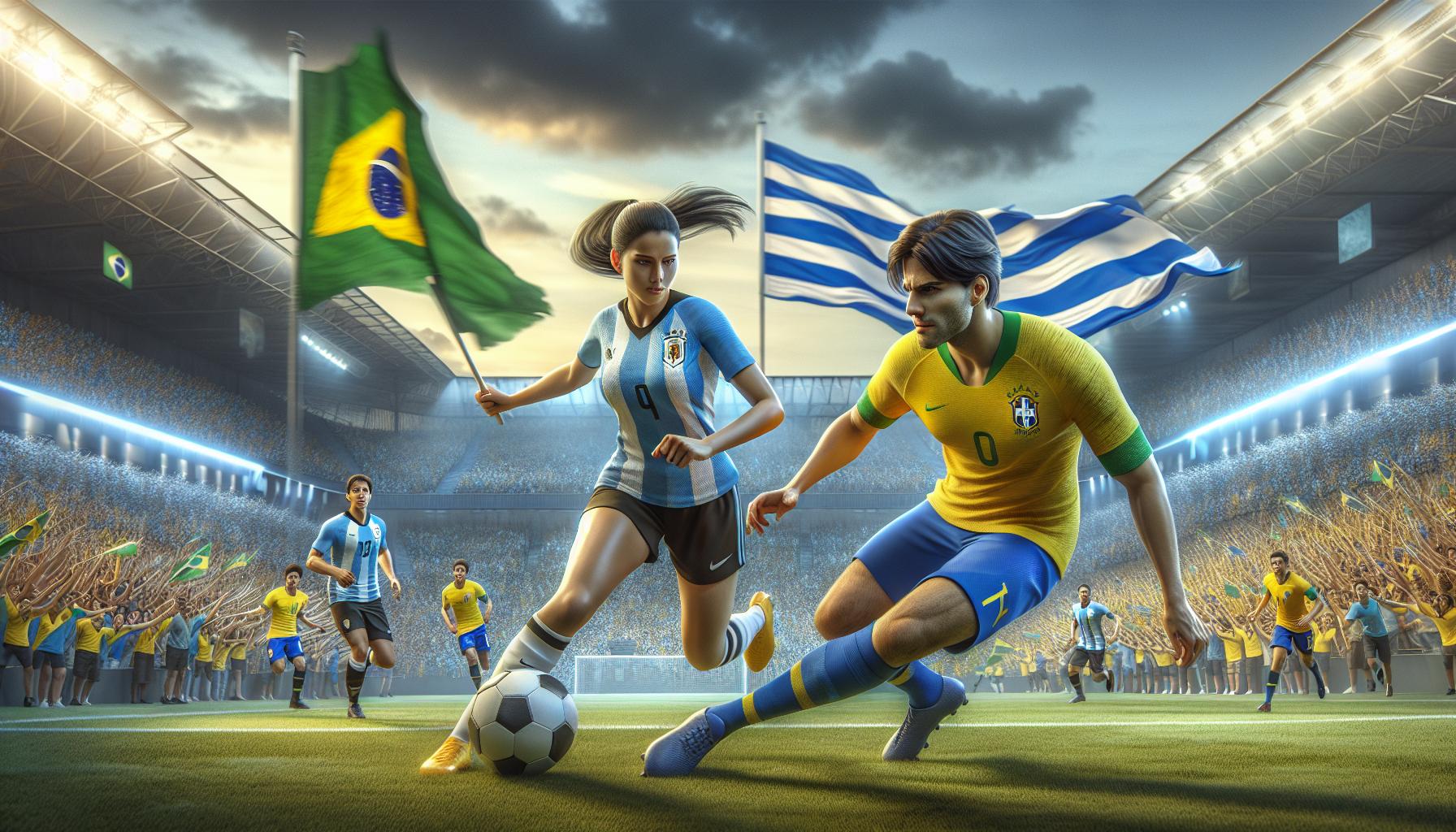
As a soccer enthusiast, I’m thrilled to dive into the upcoming clash between two South American powerhouses: Uruguay and Brazil. This match promises to be a spectacle of skill, strategy, and national pride.
In this article, I’ll break down the team compositions for both Uruguay and Brazil. We’ll explore the key players, tactical formations, and potential game-changers that could tip the scales in either team’s favor. Whether you’re a die-hard fan or a casual observer, understanding these lineups will enhance your appreciation of the match and give you insights into what to expect on the pitch.
Key Takeaways
- Uruguay and Brazil have a long-standing football rivalry, with 78 matches since 1916
- Both teams have impressive international records, including multiple World Cup and Copa América titles
- Uruguay’s tactical approach focuses on defensive solidity and counter-attacking, while Brazil emphasizes fluid attacking football
- Key players like Luis Suárez (Uruguay) and Neymar Jr. (Brazil) significantly impact their respective teams’ performances
- Recent head-to-head results favor Brazil, but matches remain closely contested
- The rivalry has positively influenced player development, tactical innovations, and the overall quality of South American football
Équipe D’uruguay de football – Équipe du Brésil de Football : Composition
The Équipe D’uruguay de football – Équipe du Brésil de Football : Composition rivalry is one of the oldest and most intense in South American soccer. These two powerhouses have faced each other 78 times since their first match in 1916, with Brazil holding a slight edge in the overall record.
Key highlights of this historic rivalry include:
- Copa América clashes: Uruguay and Brazil have met 35 times in the Copa América, South America’s premier international tournament.
- World Cup encounters: The teams have faced off in 7 World Cup matches, including the infamous “Maracanazo” in 1950.
- Olympic showdowns: Both nations have competed against each other in 3 Olympic football tournaments.
The rivalry’s intensity stems from:
- Geographic proximity: Bordering countries with a shared passion for football
- Historical success: Combined, they’ve won 9 World Cups and 20 Copa América titles
- Cultural significance: Football is deeply ingrained in both nations’ identities
Notable matches that have shaped this rivalry:
- 1950 World Cup Final: Uruguay’s shocking 2-1 victory over Brazil at the Maracanã Stadium
- 1970 World Cup Semi-Final: Brazil’s 3-1 win en route to their third World Cup title
- 1983 Copa América Final: Uruguay’s triumph over Brazil to claim their 13th continental title
Recent encounters have maintained the rivalry’s competitiveness, with both teams showcasing their evolving styles and tactics. As these footballing giants prepare to face off once again, fans can expect another chapter in this storied rivalry to unfold on the pitch.
Uruguay National Football Team

The Uruguay national football team, known as La Celeste, boasts a rich history and impressive achievements in international soccer. I’ll explore the team’s legacy, key players, and current squad composition.
Team History and Achievements
Uruguay’s national team has a storied past, including two FIFA World Cup titles (1930 and 1950). They’ve won 15 Copa América championships, making them the most successful team in the tournament’s history. Uruguay also claimed Olympic gold medals in 1924 and 1928, solidifying their status as early powerhouses in world football.
Key Players and Their Roles
Luis Suárez, Uruguay’s all-time leading goalscorer, spearheads the attack with his clinical finishing and tenacity. Edinson Cavani complements Suárez up front, offering aerial prowess and intelligent movement. Federico Valverde anchors the midfield, providing energy, vision, and defensive cover. Diego Godín, the team’s captain, marshals the defense with his experience and leadership.
Current Squad Composition
Uruguay’s current squad blends seasoned veterans with emerging talents. The defensive line features José María Giménez and Ronald Araújo, offering a mix of experience and youthful vigor. Rodrigo Bentancur and Lucas Torreira provide stability in midfield. In attack, Darwin Núñez represents the next generation, offering pace and goal-scoring ability to supplement the established forwards.
Brazil National Football Team

The Équipe D’uruguay de football – Équipe du Brésil de Football : Composition team, nicknamed Seleção, is one of the most successful and iconic teams in soccer history. With a record five FIFA World Cup titles and numerous other accolades, Brazil has consistently been a powerhouse in international football.
Legacy and Major Accomplishments
Brazil’s football legacy is unparalleled, boasting five FIFA World Cup victories (1958, 1962, 1970, 1994, 2002). They’ve also clinched nine Copa América titles and four Confederations Cup trophies. The team’s attacking style, known as “Jogo Bonito” (Beautiful Game), has influenced football worldwide and produced legendary players like Pelé, Ronaldo, and Ronaldinho.
Star Players and Their Impact
Brazil’s current roster features world-class talents who’ve made significant impacts on the international stage. Neymar Jr., with over 70 goals for the national team, leads the attack with his dribbling skills and creativity. Casemiro anchors the midfield, providing crucial defensive stability and distribution. Alisson Becker, widely regarded as one of the best goalkeepers globally, offers a solid last line of defense for the team.
Present-Day Team Lineup
Brazil’s current lineup blends experienced veterans with emerging talents. The defense is bolstered by players like Marquinhos and Thiago Silva, while the midfield features dynamic players such as Bruno Guimarães and Lucas Paquetá. In attack, Vinícius Júnior and Richarlison complement Neymar, forming a potent offensive trio. This balanced squad, under the guidance of coach Tite, aims to maintain Brazil’s status as a top contender in international competitions.
Head-to-Head Comparison

Uruguay and Brazil’s football rivalry extends beyond historical significance, reflecting in their contrasting playing styles and recent match results. This comparison highlights the key differences and similarities between these South American powerhouses.
Playing Styles and Tactics
Uruguay’s tactical approach emphasizes defensive solidity and counter-attacking prowess. La Celeste typically employs a 4-4-2 formation, relying on a compact midfield and quick transitions to create scoring opportunities. Their style is characterized by:
- Strong aerial presence in both defense and attack
- Aggressive pressing to disrupt opponents’ buildup play
- Efficient use of set-pieces to capitalize on physical advantages
Brazil’s Seleção, in contrast, adheres to the “Jogo Bonito” philosophy, prioritizing fluid attacking football. Their preferred 4-3-3 formation allows for:
- High possession rates with quick, short passing
- Creative individual skills to unlock defenses
- Dynamic movement off the ball to create space
These contrasting approaches often lead to intriguing tactical battles when the two teams face off.
Recent Match Results
Recent encounters between Uruguay and Brazil have showcased the competitive nature of their rivalry:
| Date | Competition | Result |
|---|---|---|
| 2021-11-16 | World Cup Qualifier | Brazil 2-0 Uruguay |
| 2020-11-17 | World Cup Qualifier | Uruguay 0-2 Brazil |
| 2018-11-16 | Friendly | Brazil 1-0 Uruguay |
| 2016-03-25 | World Cup Qualifier | Brazil 2-2 Uruguay |
| 2013-06-26 | Confederations Cup | Brazil 2-1 Uruguay |
Brazil’s recent dominance is evident, winning three of their last five meetings. However, Uruguay’s resilience is clear in the closely contested scorelines, reflecting the intensity of this historic rivalry.
Impact on South American Football
The Uruguay-Brazil rivalry has significantly shaped South American football, influencing player development, tactical innovations, and regional competitions. This intense competition has elevated the quality of play across the continent, inspiring other nations to raise their standards.
Player Development
The rivalry between Uruguay and Brazil has fostered a competitive environment that nurtures world-class talent. Players from both nations often become sought-after assets in top European leagues. Examples include:
- Luis Suárez (Uruguay): Barcelona, Liverpool
- Neymar Jr. (Brazil): Paris Saint-Germain, Barcelona
- Edinson Cavani (Uruguay): Paris Saint-Germain, Manchester United
- Alisson Becker (Brazil): Liverpool
Tactical Innovations
Uruguay and Brazil’s contrasting playing styles have led to tactical advancements in South American football:
- Uruguay’s defensive solidity influenced counter-attacking strategies
- Brazil’s “Jogo Bonito” inspired creative, possession-based approaches
- Both teams contributed to the evolution of pressing techniques
- Set-piece innovations emerged from their frequent encounters
Regional Competitions
The Uruguay-Brazil rivalry has enhanced the prestige and competitiveness of South American tournaments:
| Competition | Impact |
|---|---|
| Copa América | Increased viewership and global interest |
| World Cup Qualifiers | Elevated importance of CONMEBOL matches |
| Olympic Football | Improved South American performance |
Continental Dominance
Uruguay and Brazil’s success has established South America as a footballing powerhouse:
- Combined 7 FIFA World Cup titles
- 24 Copa América championships between them
- Consistent representation in later stages of international tournaments
- Influence on FIFA rankings and seedings
Their rivalry has pushed both nations to maintain high standards, contributing to South America’s reputation for producing top-tier football talent and competitive national teams.
Uruguay-Brazil Soccer Rivalry
The Uruguay-Brazil soccer rivalry continues to captivate fans worldwide. With their rich histories storied players and contrasting styles these teams exemplify the best of South American football. As they prepare to face off once again I’m excited to see how their latest encounter will unfold. This match promises to be another thrilling chapter in one of soccer’s greatest rivalries showcasing the passion skill and tactical prowess that make the beautiful game so compelling. I’ll be watching eagerly to see which team comes out on top in this clash of titans.







